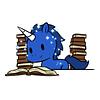Take a photo of a barcode or cover

bluehairedlibrarian 's review for:
The Second Mountain: The Quest for a Moral Life
by David Brooks
While I found what he said about communities interesting and insightful, a majority of this book felt steeped in unacknowledged privilege. It romanticizes some utopian society where people are more integrated in each other's lives without exploring how that would work in such a diverse society. Many people choose to be hyper individualistic because they spent their formative years as part of a interconnected society that did not accept them as they are and wanted them to conform to a specific ideal.
Also, I felt the middle parts were just autobiography as "the best way" instead of a sociological examination of society. The religion piece especially felt like "this is how I've gone through my journey, so it's the right way". It didn't sit well with me, which is probably why it took so damn long to read it.
Also, also, he flippantly refers to mental illness and dismisses that it is caused by chemical imbalances in the brain, but rather it's because society isn't the same as it was in the 1930s. I not-so-calmly closed the book and threw it across the room before ignoring it for a few days.
Dear future self, please don't feel inclined to read nonfiction books just because someone you admire quotes/is seen carrying it. Normally it will annoy you and you're never going to meet the person you admire so you can argue with them about it. Sincerely, current self.
Also, I felt the middle parts were just autobiography as "the best way" instead of a sociological examination of society. The religion piece especially felt like "this is how I've gone through my journey, so it's the right way". It didn't sit well with me, which is probably why it took so damn long to read it.
Also, also, he flippantly refers to mental illness and dismisses that it is caused by chemical imbalances in the brain, but rather it's because society isn't the same as it was in the 1930s. I not-so-calmly closed the book and threw it across the room before ignoring it for a few days.
Dear future self, please don't feel inclined to read nonfiction books just because someone you admire quotes/is seen carrying it. Normally it will annoy you and you're never going to meet the person you admire so you can argue with them about it. Sincerely, current self.